
Miracle children fail to make most front pages
What a week for news! A former prime minister quits Parliament, a former first minister is arrested, a former president appears in an American court on 37 criminal charges, a royal prince gives evidence in an English court for the first time in more than a century. Then there was the opening of the Covid inquiry, the promised (as I write) closure of the partygate inquiry, not to mention murder, mayhem and a miracle at home and abroad.

With all that going on, should we be surprised that lead stories in our national papers have included Jack Grealish being a bit wobbly after Manchester City’s treble celebrations, another prediction that mortgage rates will rise, an actress who played a soap opera barmaid having dementia, and a “vision” of Britain under Keir Starmer (which was, in fact, a snapshot of things that had actually happened in Rishi Sunak’s Britain)?
Why not? You might reply. All human life is there. But is it? Which lives do we care about? Those of two students and a van driver knifed to death in Nottingham, obviously. They made the lead for almost every daily yesterday. The exceptions being the FT (the Bank of England governor on inflation) and the i (that mortgage rate prediction). Most papers also gave the Nottingham killings a spread inside. Because random murderous attacks on strangers in the street are, thankfully, so rare as to be newsworthy.
The shooting dead of an 11-year-old expat British girl by a neighbour in Brittany was also front-page news, as was the non-fatal stabbing of four children, including a three-year-old British girl, and two adults in a park in Annecy. Both would obviously have been even bigger stories had they happened here – and both would have been lucky to make a nib had the victims not included British children. Then there were the three Brits killed when a tourist boat caught fire in Egypt.
We are always more interested in stories about “people like us”, especially when they take place close to home or in familiar territory – such as somewhere in France where we might go on holiday. At least, that’s the received wisdom in newspaper offices. But I would like to think that we, the public, are less narrowly focused than editors might suppose.
Saturday night’s family-dinner chat roamed over all the topics that those editors had decreed – Phillip Schofield and the question of grooming, Johnson’s departure, Manchester City – but the one that most engaged us all was the rescue of four children, one of them an 11-month-old baby, after 40 days in the Colombian jungle. How they had survived, how they had been found, the detail of the trail of nappies – this was a film just waiting to be made. Surely our press would recognise that this was a story everyone would want to read?
Only the Observer put it on page one – as a puff – with a full story on page three. The Sunday Times had it on 7, the Express on 9, the Mirror and People (which are essentially exactly the same paper with odd typographical differences) on 10, the Sun on 14-15, while the Telegraph and Mail both pushed it back to 17. Many of these papers had the word “Miracle” in the headline. But they still didn’t pick up on the clue. Either the word was overworked and misused or they failed to grasp its meaning. Maybe the word “indigenous” was a turn-off; maybe they thought these foreign children had some mysterious magical powers that somehow lessened their amazing feat of endurance and ingenuity. Or maybe there just wasn’t enough detail – even though they all had photographs of the children and the rescue team.
If that were the case, perhaps the Mondays would do more with the story. Quite the contrary. Apart from the i and Guardian, which each gave the follow-up a full-page (excellent reads from Graham Keeley and Sam Jones), coverage was generally limited to pictures of the children in hospital and a short story. The Telegraph had only a downpage pic and two-line caption, with the kicker “Miracle survivors”, while the Mirror ran its photographs under the incomprehensible headline “Playing and with family”.


Every title had Manchester City on their fronts; every Monday paper had Manchester City as a spread, far ahead of the jungle survivors. And, of course, everyone had Boris Johnson centre stage. I’m not saying those judgments were wrong. But the Sunday Times and Sunday Telegraph are broadsheets with high story counts; the Times’s main photograph was of an on-parade Guardsman collapsed in the heat – the sort of thing we’ve seen almost every summer – and the Telegraph had two Johnson elements – the splash and the puff. Couldn’t one of those slots have gone to the “miracle” children?
Moral dilemma over Stoke woman’s 34th week termination
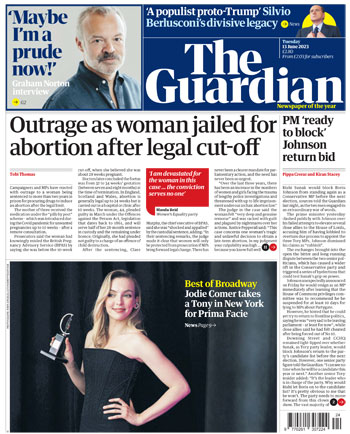
Another story that seemed to me to have been underplayed – at least initially – was that of the mother from Stoke jailed for buying abortion pills online during the pandemic, leading to her daughter’s still-birth in the 34th week of pregnancy. The Guardian splashed on the case on Tuesday, but everyone else carried only short stories, often far back in the book.
The thrust of the Guardian story was “outrage” at the sentence – 28 months, half of it to be spent in custody – and calls from various groups, campaigners and MPs for a change in the abortion law. The Royal College of Obstetricians and Gynaecologists and the Royal College of Midwives were among signatories to a letter sent in plea of mitigation, urging the judge to consider leniency, but he had dismissed it as “inappropriate”.
There was much more yesterday. The Mail, for example, promoted the story from page 26 to page 10 – the prime minister ruling out a change to the law – plus a front-page puff to Sarah Vine’s column. Maybe editors and news editors were jolted awake by the big-gun female columnists who share their wisdom with the world on a Wednesday and who all pounced on this as a hot topic.
Reading the reports on Tuesday, I was appalled by the idea of such a late abortion – my first grandson was born at 35 weeks, not an “amoeba” but a complete, fully-formed child – and aghast at the sentence – my first thought being “what about her other children?” She has three, one of them with unspecified special needs.
What good would jailing this woman do? Act as a deterrent? How many other women are going to use underhand methods to procure pills for a late abortion? Help to rehabilitate her? Is she really likely to do this again? Protect society? Is she a danger to others? Punish her? Well, yes. But the judge himself recognised that she had subjected herself to a lifetime of punishment and guilt. And there are other ways to punish people than to put them behind bars and leave three children without their mother.
I was also struck by the judge’s comment that he “could” have given her a suspended sentence had she pleaded guilty at the earliest opportunity, which sort of suggested to me that a custodial sentence was mandatory. Really?
All of this is the sort of thing that should be the subject of calm, public debate. Would I, for a start, have asked – and answered – all those same questions had the mother proceeded with the pregnancy and then smothered the baby once it had been born? For in terms of right to life, surely there could be no difference between this viable foetus and a newborn.
The campaigners fear that desperate women will be put off seeking help if they think they are going to be arrested and sent to prison. They are also concerned that women who lose their babies through no fault of their own are increasingly being subjected to police investigation – 30 last year. But when they call for abortion law reform, are they suggesting that terminations at 32 or 34 weeks should be legal?
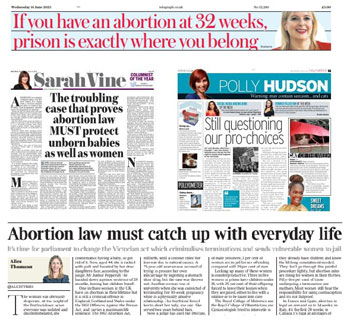
Sarah Vine and Allison Pearson (in the Telegraph) were unequivocal in their verdict: no one should be forced to continue with an unwanted pregnancy, so long as they acted in the first trimester, but after that, the unborn child should be protected. This woman had left it too late and was rightly jailed. Polly Hudson in the Mirror turned the case into an examination of her own “pro-choice” attitudes. But it was Alice Thomson in The Times who proved the most enlightening – and, in the process, produced the most compelling argument for the abortion laws to be revisited so that Britain can avoid reliving America’s Wade v Roe meltdown.
For, contrary to what most of us may think, it seems that abortion has never been legalised in England, Wales or Scotland (it was in Northern Ireland in 2019). Rather, the 1967 Abortion Act merely provided an exemption to the crime of inducing a termination; this applies if it takes place with the consent of two doctors and within the first 24 weeks of pregnancy. So, technically, women taking abortion pills at home without medical supervision even in the early days of pregnancy – as many, many do – are committing a crime.
That crime is codified by the 1861 Offences Against the Person Act, under which the woman in Stoke was charged. These are the relevant clauses, that still apply today:
58 Administering Drugs or using Instruments to procure Abortion.
Every Woman, being with Child, who, with Intent to procure her own Miscarriage, shall unlawfully administer to herself any Poison or other noxious Thing, or shall unlawfully use any Instrument or other Means whatsoever with the like Intent, and whosoever, with Intent to procure the Miscarriage of any Woman, whether she be or be not with Child, shall unlawfully administer to her or cause to be taken by her any Poison or other noxious Thing, or shall unlawfully use any Instrument or other Means whatsoever with the like Intent, shall be guilty of Felony, and being convicted thereof shall be liable, at the Discretion of the Court, to be kept in Penal Servitude for Life or for any Term not less than Three Years,—or to be imprisoned for any Term not exceeding Two Years, with or without Hard Labour, and with or without Solitary Confinement.
59 Procuring Drugs, &c. to cause Abortion.
Whosoever shall unlawfully supply or procure any Poison or other noxious Thing, or any Instrument or Thing whatsoever, knowing that the same is intended to be unlawfully used or employed with Intent to procure the Miscarriage of any Woman, whether she be or be not with Child, shall be guilty of a Misdemeanor, and being convicted thereof shall be liable, at the Discretion of the Court, to be kept in Penal Servitude for the Term of Three Years, or to be imprisoned for any Term not exceeding Two Years, with or without Hard Labour.
Now tell me they are not ripe for review.
Who decides what we read? And are they making the right choices?

The underwhelmed – and underwhelming – treatment of these two stories set me thinking about the people who are making judgments about what people need or want to read: our best-selling paper, supposedly aimed squarely at aspirational, intelligent women, is edited by a man; the second-best, with its blokeish outlook, is edited by a woman. Does that matter – or affect their news values?
They would obviously say not, but I detect a missing of the mark, jokes that fall flat. Many Sun readers may be avid football fans, but that doesn’t mean that a player having a few too many celebratory drinks or another splitting up with his partner interests or concerns them above all else on any given day. Equally, there is a smack of patronising paternalism in front pages that dress up a political agenda with a photograph of a royal or celeb in a pretty dress and a strident woman opining across the top of the masthead. There’s a cynical “That’ll bring in the ladies” feel about it.
And what about the popular press in general? We expect what used to be the “broadsheets” to be preoccupied with politics, the minutiae of Westminster, but do whitetop readers want this constant battering with what Suella thinks about Keir, what Jacob thinks of Boris, Rishi’s latest promise? Yes, they all want to show how influential they are with the people that run the country, to be seen to be “making a difference” or “speaking for the reader”. But “General election now” as a redtop Sunday splash? It’s not going to happen. They know it’s not going to happen. What’s the point? Why not give readers something fresh and new, a story that might interest and amaze them – like four children surviving alone for six weeks in the jungle?

And what was the i thinking yesterday, splashing not on Nottingham, but on the prediction that interest rates would go up to 5.75% by the end of the year? That was the third “mortgage misery” lead in a month, and there’s another today. This is an abiding concern for millions of people, but it’s just another signpost, not a concrete story that tells people something they otherwise wouldn’t have an inkling about – stories like Tuesday’s “Russian ‘agent’ living in UK thanks to homes for Ukraine”.
Of course, there’s no escaping Boris Johnson. The resignation and the open spat with Rishi Sunak were obviously nailed-on splashes. But all the WhatsApp to-ing and fro-ing, the old phone that could or couldn’t be switched on? Inside stories surely, even for the Westminster nerds. It wouldn’t be so bad if there wasn’t so much speculation and reliance on “friends” and “insiders”. Take the standards committee verdict and suggested sanction. It was going to suspend him for “less than the ten days that would trigger a recall and by-election”, for “more than ten days”, for “twenty days”. No one saw the 90 days in the report published today coming.
Johnson: victim or villain?
As to the resignation itself, Fleet Street divided itself into predictable camps: the Mail and Express swallowing whole-heartedly the “forced out” by a “witch-hunt” and “kangaroo court” narrative that they had been peddling for months; the Sun and Telegraph were generally sympathetic, but not to quite the same degree. Peter Cruddas, ennobled by Johnson in spite of his rejection by the vetting committee, wrote in the Sunday Telegraph of his shock at the “shamelessness and utter disregard for democracy” that had “stitched up” Johnson, a “force of nature” who had a “sense of duty” to deliver what many Britons voted for. Cruddas was appalled by the ousting of Johnson as prime minister, sought unsuccessfully to have his name put on the party leadership ballot papers sent to members and went on to set up the Conservative Democratic Organisation, which wants to give grassroots Tories a greater say. Speakers at its inaugural conference last month included Jacob Rees-Mogg and Priti Patel.


On the other side of the political divide, the Mirror and Guardian delighted in the end result of their Partygate exposés and the Star, as usual, made fun of Bozo the Clown. Marina Hyde in the Guardian yesterday shed sparkling crocodile tears for the Johnson friends and supporters who remained staunch, “spouting off about how appallingly he’s been treated”:
“Behold, an absolute cavalcade of betas, who spent the nicest weekend of the year so far crying anonymous quotes down the phone about a guy who'd cheerily have sex with their wives while they were out of town doing some boring little job for him that he couldn't be arsed doing himself. And after reading some of their output over the past few days, I strongly suspect their only reaction to this would be to apologise for not having changed the sheets for him before they set off.”
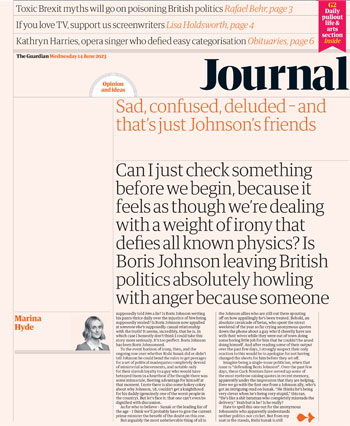
She was writing about people talking to broadcasters, but she could just as well have been referring to the whitetops, which remain convinced that the public still love Boris. The Mail had a sycophantic leader that took a swipe at the “unholy alliance of Leftist loudmouths, hand-wringing liberals and embittered Remainers” and concluded: “He can hold his head high. His everyman vision was genuinely inspiring.” While the Express had a “personal message” from the man himself to its readers saying that, “like the great Arnold Schwarzenegger, I’ll be back”. Such unequivocal devotion makes the papers look a tad out of touch with public sentiment, but the Express reported that it had been inundated with letters from Johnson supporters furious at the way he had been “forced out”, and that 98% of respondents to an online poll believed that he was the victim of a kangaroo court. Not so out of touch then? But that’s 98% of 1,600 self-selected people.
Meanwhile, more mainstream polling organisations reported that the country had had enough of him. A YouGov survey of 2,000 people last week found that 85% thought he’d lied about the parties, 68% thought he should quit as an MP and 60% thought the standards investigation was fair. Sir John Curtice, the most respected voice of polling, told the BBC that when asked for a single word to describe someone, the word that cropped up most frequently for Keir Starmer was “boring”. For Johnson, it was “liar”.
For now, Sunak is being painted as the villain of the piece – though the Express is more circumspect about this line than its more popular rival – but they will both be urging readers to vote for him next year. In the meantime, the Mail is focused on denigrating Starmer – with five Labour-bashing lead stories so far this month. That will certainly bring in the ladies – so long as there’s a picture of Camilla in flares alongside.

The Times changes its tune
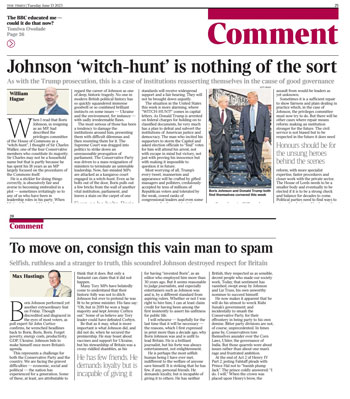
If we can expect some nifty reverse-ferreting from the Mail with regard to Sunak before the next election, it’s quite amusing to look at how the Times has changed its tune towards Johnson. This week has been brutal, with some highly entertaining op-ed offerings from Max Hastings, William Hague and Daniel Finkelstein – plus a leader that said, “The quality of public life is being needlessly tarnished by Mr Johnson's obdurate refusal to acknowledge fault” and urged the Conservatives to get behind Sunak and leave Johnson “to flail alone”. This from a paper edited by the man who, when in charge of the Sun, urged readers to pray for him. But the real gems came from Hastings and Hague.
First, Hastings: “We must stop talking about Boris Johnson; consign him to the spam box”; “his stewardship of Britain was a crony-ridden shambles”; and this killer paragraph:
“He is perhaps the most selfish human being I have ever met, indifferent to the welfare of anyone save himself. It is striking that he has few, if any, personal friends. He demands loyalty, but is incapable of giving it to others. He has neither principles nor personal convictions, save about his own ambitions and desires. Far from being the genial Mr Nice Guy he seeks to project, Tony Soprano would find him a tad ruthless. He is a stranger to truth, a lifelong liar about big things and small.”
Then Hague: “I regard the career of Johnson as one of deep, historic tragedy”; “No one in modern British political history has so quickly squandered immense goodwill or so combined brilliant instincts on some issues…with sadly irredeemable flaws. The most serious of those has been a tendency to damage the institutions around him, presenting them with difficult dilemmas and then resenting them for it.”
And his pièce de resistance about Tory standards committee members Charles Walker and Bernard Jenkin and the witch-hunt claims: “If anyone wanted to launch a witch-hunt, Sir Charles, or indeed Sir Bernard…would be among the last people they would ever ask to join it. Within minutes, these MPs would be forming an all-party group for the defence of witches and demanding a fair trial for witches throughout the land.”
All of which is very jolly. Except the subject of this Notebook item is reverse ferreting. So, it’s worth reminding ourselves what the Times (under a different editor) had to say in July 2019, when the Tories were looking for a new leader to replace Theresa May. It knew it was backing a dodgy horse, but did so anyway:
“Mr Johnson's weaknesses are well known and have been repeatedly raised during the campaign: there are legitimate questions about his honesty, loyalty and personal relationships…Lack of discipline could be a real problem as prime minister…
“Bluntly, he is the only Tory with the charisma to take on Mr Farage and Mr Corbyn. For that reason, The Times urges Tory members to back Mr Johnson. There is no doubt that making him prime minister is a risk. But he is the only candidate with a credible chance of meeting the three challenges correctly identified in his campaign strategy: deliver Brexit, unite the country and defeat Mr Corbyn…
“Should he fail, the man who has spent much of his life plotting for this moment could find himself the shortest-lived prime minister in British history.”

Meanwhile, over at the Sun, the Times’s present editor had more modest reservations in his double-page leader, headlined “It has to be Boris”: could he resist shooting from the hip, would he be smart enough to appoint the best advisers, would he have the necessary “laser-like focus”? But he projected optimism and determination; his infectious humour inspired people, so it concluded: “Boris is our best bet to get Britain back on track and surging into a golden new era.”
Cuttings libraries can be cruel.
(Dis)Honours List
Which brings me to that honours list. The list whose notable absentees included Nadine Dorries, Stanley Johnson, Paul Dacre and Ted Verity (who reportedly turned down a knighthood once it became known that Dacre’s peerage wasn’t going to happen).
As most of us know, the big names that made the cut included Jacob Rees-Mogg, Priti Patel and Andrea Jenkyns. Then there were all the partygate prizes: peerages for former London mayoral candidate Shaun Bailey, who resigned from the capital’s police and crime committee after being photographed at a Christmas party when Covid restrictions were in force, and Dan Rosenfield, who quit as Downing Street chief of staff after he, too, attended a Christmas party that shouldn’t have taken place; “Party Marty” Reynolds, author of the BYOB invitation to “make the most of the weather”, was made a Companion of the Order of the Bath, and Jack Doyle – a former Mail associate editor who became No 10’s press chief and also ended up resigning after handing out prizes at another Christmas party – became a CBE. Quite how the two incumbent Mail chiefs felt about being denied while their former colleague was honoured (there was a knighthood, too, for former Telegraph and News International chief Will Lewis) is not on record.
But that wasn’t the end to it: there was a peerage for Ben Houchen, the mayor of Tees Valley, who is embroiled in allegations of cronyism and corruption surrounding a proposed freeport on his patch, and a knighthood for the Queen’s nephew Ben Elliot, a former Tory co-chairman whose Quintessentially “concierge” service was linked to Russian donors and a cash-for-access controversy. Oh yes, and Johnson’s hairdresser became an MBE. Altogether, there were 45 gongs for services rendered to B. Johnson Esq and his wife Carrie. Sorry, I mean for political and public service.
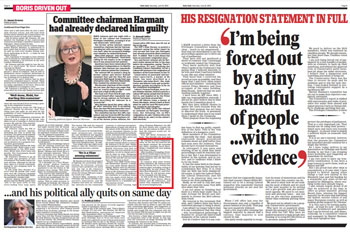
Well, these things are always exercises in nepotism and cronyism – some of us remember Marcia Falkender’s lavender list; Maggie gave Denis a baronetcy so that Mark would become a hereditary peer. So what? You can hear the Mail say, as it consigned the list to four paragraphs of edited highlights at the foot of its “Boris forced out” splash. These reported that “in common with former prime ministers”, Johnson had used the list to reward key political allies, but named only eight recipients. Houchen, Bailey, Reynolds and Doyle were not mentioned. Nor was the hairdresser.
Was that really it? Yes. That was the extent of its coverage – unless you count Nadine’s “I’m a poor girl from Liverpool and sinister forces kept me out of the Lords” column on Tuesday.
Fair enough. Awards for Brexit campaigners, aides, donors and stylists are nothing to get worked up about.
So let’s look back to 2016 and David Cameron’s resignation honours. Four paragraphs? A little more than that. For five days, the paper railed at the “gongs for cronies”, the awards for Remain campaigners, aides, donors and stylists. These were the “toxic honours no one wants”, the ex-PM’s “two fingers to the voters” as he “showered honours on chums, cronies and second-raters”. (There has been no suggestion this week that Johnson’s list might be seen as two fingers to more than 200,000 Covid victims or those who obeyed lockdown rules while Downing Street partied.) There was also a snipe at the “toothless watchdogs” charged with vetting candidates, and gloating at the “humiliation” of someone whose name had been rejected for a peerage.
As I say, cuttings libraries are cruel things. But in the spirit of schadenfreude, let’s take another look at that coverage:

Telegraph sale – the runners and riders
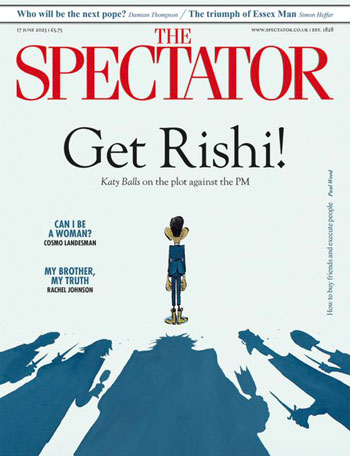
A quick word about the Telegraph, which is up for sale after being seized by Lloyds over unpaid debts. It’s hard to find people willing to invest in newspapers. That’s why Murdoch ended up with Eddy Shah’s Today (remember that?) when he already owned two dailies and two Sundays.
Media plurality and diversity is difficult to achieve – Reach now owns two dailies and three Sundays, plus countless local papers. The Mail owners DMGT are favourites to buy the Telegraph titles, which would leave it with four dailies (it also has Metro and i) and two Sundays; Murdoch is reportedly interested in the Spectator, which would give him two dailies, two Sundays, a weekly magazine plus a TV and radio station.
There are, of course, others in the frame who might be interested – mostly foreign investors. Foreign investment is obviously good for the country, but it has its downsides. Our rail franchises, electricity suppliers, water companies are largely owned by overseas businesses, many of them collecting subsidies from the UK taxpayer and delivering dividends to shareholders at home. Murdoch’s business is based in America, the Mail’s owner is a non-dom. Newspapers seek to influence British politics, claiming to argue for their readers, British voters. Without being too nationalistic, if only there were some mechanism to ensure that when the Telegraph titles are sold, they go to someone – wherever they sit on the political spectrum - who lives and pays taxes here.
Front page of the fortnight
I have deliberately avoided writing about Prince Harry’s days in court, although it has to be said his evidence was far from compelling. He may have natural justice on his side, but if he wants to see reform of the Press, he needs to do better than, “They’ve been nasty to me all my life”. Going in without the necessary ammunition will make change less rather than more likely and could make matters worse. Most papers covered his testimony better than they had done previous hearings and only the Mail was overtly snide. The best read, to my mind, on the case came from Hardeep Matharu of Byline Times, which spoke from the heart even if it didn’t address the lack of the killer evidence Harry needs.
My surprise choice for front page of the fortnight is this from the Sun, whose four headlines managed to avoid commentary and self-interest – although the scrap of text had him contradicting himself and being accused of “living in a realm of total speculation”. But the main reason it’s a winner is that it’s a page you want to pick up and read.

Liz Gerard’s Notebook is a fortnightly column published in the InPubWeekly newsletter. To be added to the mailing list, enter your email address here.












